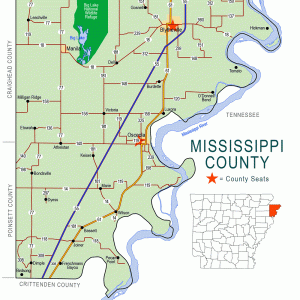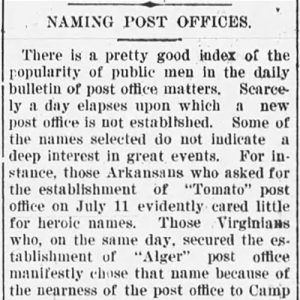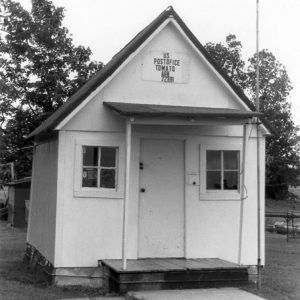calsfoundation@cals.org
Tomato (Mississippi County)
The small, unincorporated farming community of Tomato in Mississippi County, located near the Mississippi River in eastern Arkansas, was once touted as being home to the nation’s smallest post office and has been called Arkansas’s only “portable town.”
The small but busy river community was established in the late 1800s on high ground inside an 1836 river levee. Cotton farmers were attracted to the area due to the rich soil created by regular flooding. Little information exists regarding the founding of the town; however, a post office was established in 1898. At the town’s peak in the early 1900s, it consisted of three stores, three churches, a schoolhouse, and residential homes.
In the early days the town was called Canadian Reach and Cedar Landing. How it became known as Tomato is documented in two varying local traditions. When the town was being considered for a post office, a postal representative was sent to inquire into the name. In the midst of the discussion, the owner of the local store, a Mr. Coleman, asked for his daughter Letty’s opinion. While holding a can of tomatoes in her hand, she is reported to have said, “Oh, why not just name it Tomato.” A second tradition states that a crate was attached to a post or tree near the river bank for the delivery of items by riverboat captains. The crate reportedly was decorated with a colorful picture of a tomato. Riverboat captains began to refer to the stop as Tomato.
The post office was once touted as the smallest in the United States. The original building was swept into the Mississippi River during the Flood of 1937. Postmaster Joe Jones rebuilt the post office. When he later moved his house to avoid flooding, he moved into the post office building and relocated the postal operations into a small smoke house. By 1990, the Tomato facility was the second-smallest post office in the nation, with only twenty-three rented boxes.
The community was prone to major flooding due to its location so near the Mississippi River and inside the levee. Out of necessity, the town buildings were put on log rollers and moved away from the flood waters on several occasions. As a result of the Flood of 1937 and the crumbling riverbank, the town was relocated approximately one and a half miles from its original site. After several such moves, many people began to call Tomato a “portable town.”
In 1952, the town consisted of a church, a schoolhouse, a post office, two stores, and several houses. One of the last stores, owned by A. J. Mitchusson, had to be moved away from the banks of the river. Though river bank stabilization work by the U.S. Army Corps of Engineers in the 1960s made the area safer and more secure, the town slowly declined. The post office closed in 2002. By 2010, the town, which once claimed 350 citizens, had all but disappeared into the river.
For additional information:
Haynie, Paul. “Zip Code 72381.” Delta Historical Review 2 (Summer 1990): 59–60.
Montgomery, Clyde. “Tomato, Arkansas: It’s No Longer a Portable Town.” Arkansas Gazette, November 24, 1968, 4E.
Russell, Ray. “Through Rain, Snow, High Water…But Perhaps Not Long.” Commercial Appeal, November 17, 1976, p. 33.
Mike Polston
CALS Encyclopedia of Arkansas
 Mississippi County Map
Mississippi County Map  Post Office Naming
Post Office Naming  Tomato Post Office
Tomato Post Office 



John Fry was my great-grandfather.
Interesting history. My mother grew up in Joiner and her family farmed in the area. My sister-in-law was born in Blythville and has Cherokee ancestry. Her great-grandfather was John Ross.
Does anyone know the Johnson family who may have resided in this town in 1912? My great-great-grandmother Betty Simpson (spouse William Martin Johnson) stayed in this area.
I was born in Tomato on 2/14/1940. We moved to Memphis around 1943. I lived there until 1990 when my wife and I moved to Hardy and opened a Native American craft store. I am a descendant of Cherokees who lived in east Tennessee in the early 1600s, namely Quatsie, born 1650.
The store owned by A. J. “Slick” Mitchusson did not fall into the river but was moved from the banks of the river on up the road. I know. I am his granddaughter and stayed many a weekend with my grandparents. Their home rested right on the banks of the mighty Mississippi. Only a road separated them. I watched barges float down the river from their kitchen window.
I was born in Tomato, Arkansas, on November 21, 1947, in my grandmother Lily Harshman’s bed. My aunt Helen Carmon had a store in Tomato and was the last postmaster there.